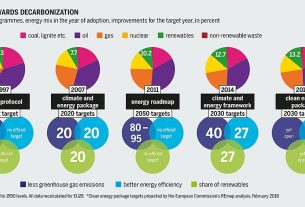Switzerland is making notable strides in its quest to achieve net-zero emissions by 2050, with a 24% reduction in emissions since 1990, despite economic growth. A new UBS white paper, “Downhill Climb,” presented at the 2024 Building Bridges Conference, outlines the ongoing challenges and opportunities facing the country’s transition to a sustainable, low-carbon economy. The document highlights the urgent need for scaling renewable energy, developing new green technologies, and securing significant financial investments to meet long-term climate targets.
Meeting Switzerland’s Net-Zero Targets
Switzerland’s emissions reduction progress has been substantial, yet the country faces significant hurdles as it looks ahead to 2050. To meet its climate objectives, the nation must more than double its electricity generation capacity from 27 gigawatts (GW) to over 60 GW by mid-century. This need is particularly pressing given that nearly a third of Switzerland’s current energy capacity will be offline by 2034 due to the planned shutdown of nuclear reactors.
Addressing seasonal energy supply fluctuations and expanding energy storage will be critical components of this transition. In sectors that cannot fully decarbonize, such as heavy industry, Switzerland will need to significantly invest in carbon capture and storage technologies, which may account for up to a quarter of current emissions.
Michael Baldinger, Chief Sustainability Officer at UBS, emphasized the potential for Switzerland to lead in emerging green markets, such as low-carbon cement and carbon capture technologies. However, the path to achieving these goals will require overcoming substantial logistical, technological, and financial challenges.
The Financial Sector’s Role in Transition
The Swiss Banking Association has estimated that Switzerland will require CHF 13 billion annually—approximately 2% of its GDP—to finance the transition to a net-zero economy. This scale of investment presents a significant opportunity for private capital to play a pivotal role, particularly through loans, bonds, and equity investments in clean energy infrastructure.
Blended finance solutions, combining public and private capital, will also be essential in scaling up green technologies. The Swiss financial sector is uniquely positioned to lead these efforts, helping to catalyze the required investments to power Switzerland’s transition.
Evolving Regulatory Landscape
Switzerland’s shift to a sustainable economy is underpinned by a comprehensive regulatory framework. Key regulations, such as the 2025 Electricity Law, the CO2 Act, and the Climate and Innovation Act, are designed to incentivize emission reductions and improve transparency in climate-related disclosures. As part of this effort, the government has launched a consultation on proposed updates to its sustainability-related disclosure rules, which are open until March 2025.
The new regulations will require companies to submit detailed “net-zero roadmaps” outlining how they plan to align with Switzerland’s 2050 emissions targets. This will include interim science-based emission reduction targets and strategies for aligning financial flows with climate goals. Companies will be required to report in a digital format, ensuring both human- and machine-readability, allowing for integration with global platforms.
These updated requirements align with international standards, such as those set by the International Sustainability Standards Board (ISSB) and the European Union’s European Sustainability Reporting Standards (ESRS), ensuring that Switzerland remains at the forefront of global climate reporting efforts.
Expanding the Reporting Scope
The new proposals also aim to broaden the scope of companies required to report climate-related factors. Currently, the rules apply to companies with over 500 employees, but under the new regulations, businesses with at least 250 employees or those with CHF 25 million in assets or CHF 50 million in sales will also be subject to these reporting requirements. The expanded scope will provide a more comprehensive view of the country’s corporate climate footprint.
Challenges and Opportunities
Switzerland’s transition to net-zero will not be without its challenges, but the country’s commitment to innovation and sustainability offers significant opportunities. By scaling renewable energy, investing in green technologies, and leveraging the financial sector’s capabilities, Switzerland can strengthen its position as a global leader in climate solutions.
Through a combination of regulatory action, private investment, and technological innovation, Switzerland is positioning itself to meet its ambitious climate goals, all while contributing to the global green economy. As the country moves forward, its evolving regulatory framework and commitment to transparency will play a crucial role in driving the widespread adoption of sustainable practices across industries.



